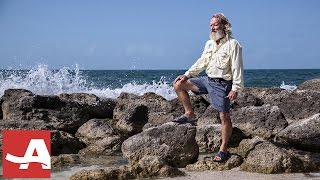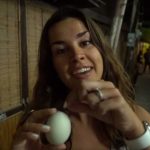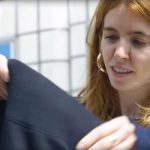Watch

I actually grow coral for planting back out on the reef.
It's been coined as my eureka moment or eureka mistake, where I broke a coral into tiny pieces and I thought it was gonna die and be very stressed. And instead, it grew like the dickens. Each of these, in just a few months, grow to the size that would have taken a few years. It was after that accident that I knew that we could restore reefs, and it was really a new lease on life, and a new brightness of what this whole career in coral research could do.
This is what I like to call the ocean simulator. So we can actually simulate what the water will be like 100 years from now
so we can try to forecast which of these corals are still gonna be winners and utilize the ones that you know will be better adapted in the future to those conditions.
The other thing to remember is that we know that your skin, if it grows very fast, is called cancer or tumors. So if we can understand what turns on fast growth of tissue in a coral or what slows down tissue, we might be able to have remedies for tumors or cancer.
These are the people that really do the heavy lifting and the real work here. I could not do this myself. When we can include student scientists as well as the older generation you get a lot of transfer of experience and data so that we're not committing the same mistakes.
I always wondered how long it would be that I'd still be able to dive. Now I know you can dive as long as you want. You're never too old to dive. Dr. Vaughan gets in the water like everyone else. [Lindsay Arick, Lab Intern] And he, if anybody, has seen the decline even more than any of us have. You know, he saw it when it was beautiful. How I may see it when I'm Dr. Vaughan's age may be the way he saw it when he was my age. So we're gonna switch the generations and I can finally see, maybe, what the reef looked like 60 years ago versus now.
I'm not gonna retire until I hit a million corals planted back on the reef. With the right conditions, we can do it in the next three to five years. People think that we've ruined this planet by technology. But with technology, we can bring it back.
[#DisruptAging Real Possibilities from AARP]
Check your understanding
Vocabulary Game
Listen
More Vocabulary
Grammar
Listen Again
Read
Most people don’t know this, but we’ve lost 25 to 40 percent of the world’s corals. And if you wonder if that’ll make a difference or not, you should ask yourself: Do you like to breathe? Land plants only produce about one-third the oxygen we breathe. The rest comes from the ocean. I’m Dr. Dave Vaughan and I’m the program manager for coral restoration at the Mote Tropical Research Center in the Florida Keys.
I actually grow coral for planting back out on the reef.
It’s been coined as my eureka moment or eureka mistake, where I broke a coral into tiny pieces and I thought it was gonna die and be very stressed. And instead, it grew like the dickens. Each of these, in just a few months, grow to the size that would have taken a few years. It was after that accident that I knew that we could restore reefs, and it was really a new lease on life, and a new brightness of what this whole career in coral research could do.
This is what I like to call the ocean simulator. So we can actually simulate what the water will be like 100 years from now, so we can try to forecast which of these corals are still gonna be winners and utilize the ones that you know will be better adapted in the future to those conditions.
The other thing to remember is that we know that your skin, if it grows very fast, is called cancer or tumors. So if we can understand what turns on fast growth of tissue in a coral or what slows down tissue, we might be able to have remedies for tumors or cancer.
These are the people that really do the heavy lifting and the real work here. I could not do this myself. When we can include student scientists as well as the older generation you get a lot of transfer of experience and data so that we’re not committing the same mistakes.
I always wondered how long it would be that I’d still be able to dive. Now I know you can dive as long as you want. You’re never too old to dive. Dr. Vaughan gets in the water like everyone else. [Lindsay Arick, Lab Intern] And he, if anybody, has seen the decline even more than any of us have. You know, he saw it when it was beautiful. How I may see it when I’m Dr. Vaughan’s age may be the way he saw it when he was my age. So we’re gonna switch the generations and I can finally see, maybe, what the reef looked like 60 years ago versus now.
I’m not gonna retire until I hit a million corals planted back on the reef. With the right conditions, we can do it in the next three to five years. People think that we’ve ruined this planet by technology. But with technology, we can bring it back.
497 words
Summary
Find the Words
Useful Phrases
coral サンゴ
Most people don’t know this, but we’ve lost 25 to 40 percent of the world’s corals.
make a difference 違いが生じる
breathe 息をする/呼吸をする
And if you wonder if that’ll make a difference or not, you should ask yourself: Do you like to breathe?
restoration 復元
I’m Dr. Dave Vaughan and I’m the program manager for coral restoration at the Mote Tropical Research Center in the Florida Keys.
reef 礁
I actually grow coral for planting back out on the reef.
coin 新しい単語または、フレーズをつくる
eureka moment 発見した瞬間/ピンときた瞬間
eureka mistake ボーン博士自身がeureka momentを基に作った新しいフレーズ。意味はeureka moment + mistakeの意味合い。
It’s been coined as my eureka moment or eureka mistake, where I broke a coral into tiny pieces and I thought it was gonna die and be very stressed.
instead それよりむしろ
the dickens 悪魔
And instead, it grew like the dickens.
a new lease on life 寿命が延びること
It was after that accident that I knew that we could restore reefs, and it was really a new lease on life, and a new brightness of what this whole career in coral research could do.
simulator シミュレーター
This is what I like to call the ocean simulator.
forecast 予測する
utilize ~を利用する/役立たせる
adapt 適応する/順応する
So we can actually simulate what the water will be like 100 years from now, so we can try to forecast which of these corals are still gonna be winners and utilize the ones that you know will be better adapted in the future to those conditions.
cancer 癌
tumor 腫瘍
The other thing to remember is that we know that your skin, if it grows very fast, is called cancer or tumors.
tissue 組織
remedy 治療法
So if we can understand what turns on fast growth of tissue in a coral or what slows down tissue, we might be able to have remedies for tumors or cancer.
transfer 移送
experience 経験
commit mistakes 間違いをする/誤りを犯す
When we can include student scientists as well as the older generation you get a lot of transfer of experience and data so that we’re not committing the same mistakes.
too …. to~ ….過ぎて~できない
You’re never too old to dive.
ruin ~を破壊する
bring back 戻す
People think that we’ve ruined this planet by technology. But with technology, we can bring it back.
Watch Again

I actually grow coral for planting back out on the reef.
It's been coined as my eureka moment or eureka mistake, where I broke a coral into tiny pieces and I thought it was gonna die and be very stressed. And instead, it grew like the dickens. Each of these, in just a few months, grow to the size that would have taken a few years. It was after that accident that I knew that we could restore reefs, and it was really a new lease on life, and a new brightness of what this whole career in coral research could do.
This is what I like to call the ocean simulator. So we can actually simulate what the water will be like 100 years from now
so we can try to forecast which of these corals are still gonna be winners and utilize the ones that you know will be better adapted in the future to those conditions.
The other thing to remember is that we know that your skin, if it grows very fast, is called cancer or tumors. So if we can understand what turns on fast growth of tissue in a coral or what slows down tissue, we might be able to have remedies for tumors or cancer.
These are the people that really do the heavy lifting and the real work here. I could not do this myself. When we can include student scientists as well as the older generation you get a lot of transfer of experience and data so that we're not committing the same mistakes.
I always wondered how long it would be that I'd still be able to dive. Now I know you can dive as long as you want. You're never too old to dive. Dr. Vaughan gets in the water like everyone else. [Lindsay Arick, Lab Intern] And he, if anybody, has seen the decline even more than any of us have. You know, he saw it when it was beautiful. How I may see it when I'm Dr. Vaughan's age may be the way he saw it when he was my age. So we're gonna switch the generations and I can finally see, maybe, what the reef looked like 60 years ago versus now.
I'm not gonna retire until I hit a million corals planted back on the reef. With the right conditions, we can do it in the next three to five years. People think that we've ruined this planet by technology. But with technology, we can bring it back.
[#DisruptAging Real Possibilities from AARP]




Comments
0 comments